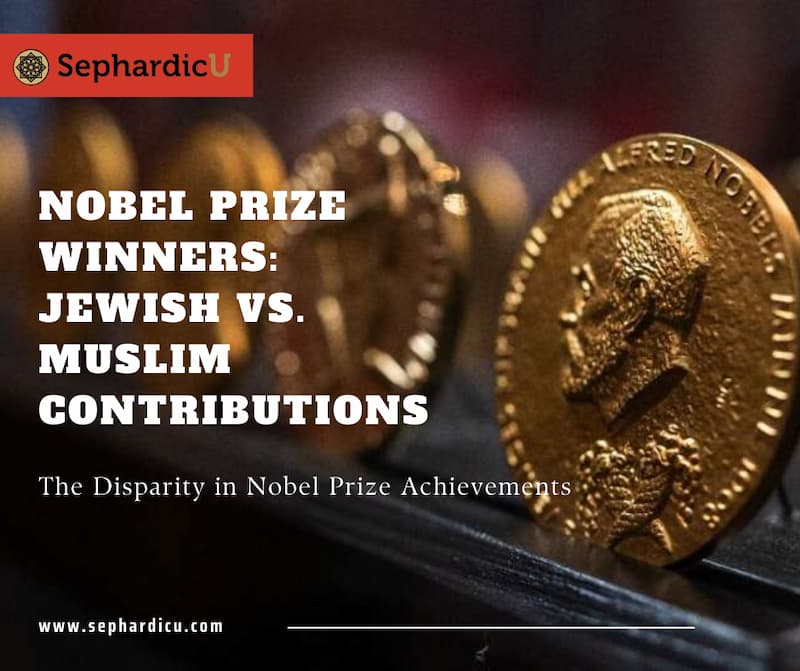The stark disparity in Nobel Prize achievements between Jewish and Muslim scientists raises important questions about societal values placed on education, mathematics, and science. While Jews make up approximately 25% of Nobel Prize winners, Muslims represent only about 0.46%. This article explores the underlying factors contributing to this significant difference.
The Disparity in Nobel Prize Achievements

According to data presented by Neil deGrasse Tyson, a notable astrophysicist, out of 655 Nobel Prize recipients since 1900, 165 have been Jewish, representing 25% of winners from a global Jewish population of around 15 million. In contrast, from the 1.5 billion Muslims worldwide, only three individuals have received Nobel Prizes, accounting for approximately 0.46%.
| Group | Nobel Prize Winners | Population Estimate | Percentage of Total Nobel Winners | Notable Winners |
|---|---|---|---|---|
| Jewish | 165 | 15 million | 25% | Albert Einstein, Elie Wiesel, Richard Feynman, Steven Weinberg |
| Muslim | 3 | 1.5 billion | 0.46% | Malala Yousafzai, Muhammad Yunus, Ahmed Zewail |
Contributions by Field
The following tables detail the distribution of Nobel Prize winners by field for both Jewish and Muslim recipients, illustrating the stark contrasts in achievements.
Jewish Nobel Prize Winners by Field
| Field | Awardees | Total | Percentage (%) |
|---|---|---|---|
| Biomedical | 49 | 196 | 25% |
| Chemistry | 28 | 158 | 18% |
| Physics | 45 | 189 | 24% |
| Economics | 28 | 66 | 42% |
| Total | 150 | 609 | 25% |
Muslim Nobel Prize Winners by Field
| Field | Awardees | Total | Percentage (%) |
|---|---|---|---|
| Biomedical | 0 | 196 | 0.00% |
| Chemistry | 1 | 158 | 0.63% |
| Physics | 1 | 189 | 0.53% |
| Economics | 1 | 66 | 1.52% |
| Total | 3 | 609 | 0.50% |
Cultural Values and Education
Tyson attributes this disparity to the differing cultural values regarding science and education within these communities. He noted that the Jewish community has consistently placed a high value on mathematics and science. This cultural emphasis has fostered an environment conducive to academic achievement and innovation.
On the other hand, Tyson pointed out that the influence of Imam Hamid al-Ghazali, a prominent theologian in Islamic history, led to the devaluation of mathematics and science in the Muslim world. Al-Ghazali categorized activities as either spiritual or earthly, suggesting that humans should focus on spiritual pursuits, thus undermining the importance of scientific inquiry.
Representation in Society
The lack of representation of scientists on currency in the Muslim world further reflects societal values regarding education and innovation. In contrast to nations like Germany, where notable scientists are honored on currency, Muslim nations have fewer representations of scientific contributions. Tyson highlighted that countries like Poland and the UK celebrate their scientific achievements through currency, showcasing figures like Marie Curie and Charles Darwin.
Addressing the Educational Gap
Tyson lamented the 1.5 billion individuals in the Muslim world who are not contributing to the frontier of discovery. He emphasized that when marginalized groups, including women, are denied access to education and scientific exploration, society as a whole suffers. The data underscores the need for renewed focus on education and science within the Muslim community to foster future Nobel Prize winners.
Conclusion
The disparity between Jewish and Muslim contributions to Nobel Prizes serves as a reflection of broader cultural attitudes towards education and science. While Jewish communities have historically placed a high priority on these fields, significant obstacles exist for Muslims, often rooted in cultural and historical contexts. Bridging this gap requires a commitment to elevating education and science across all communities, ensuring that every individual has the opportunity to participate in the pursuit of knowledge.








Ohr HaChaim Yomi – Emor